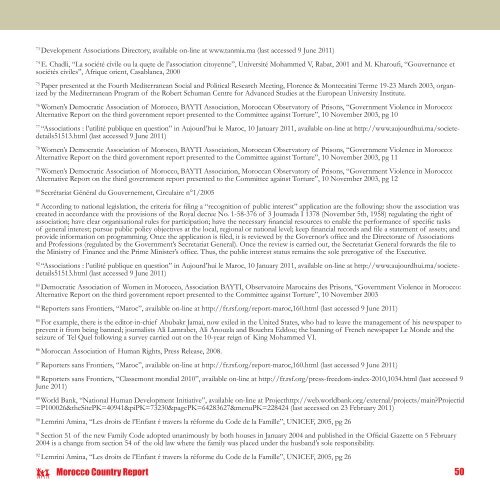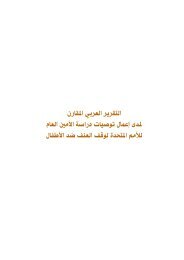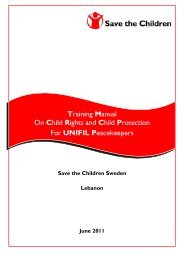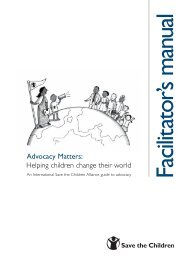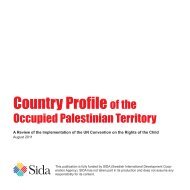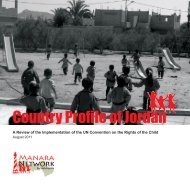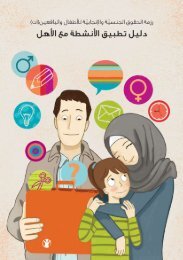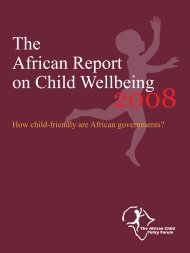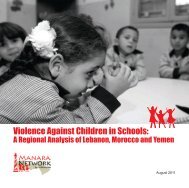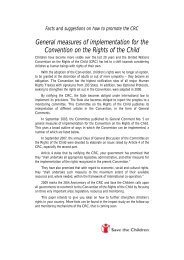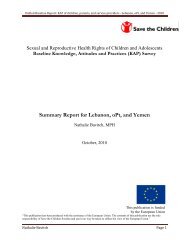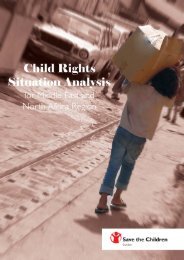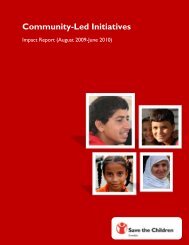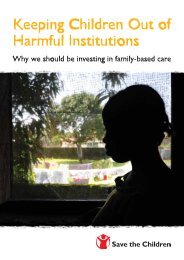Country Profile of Morocco - International Bureau of Children's Rights
Country Profile of Morocco - International Bureau of Children's Rights
Country Profile of Morocco - International Bureau of Children's Rights
Create successful ePaper yourself
Turn your PDF publications into a flip-book with our unique Google optimized e-Paper software.
73 Development Associations Directory, available on-line at www.tanmia.ma (last accessed 9 June 2011)<br />
74 E. Chadli, “La société civile ou la quęte de l’association citoyenne”, Université Mohammed V, Rabat, 2001 and M. Kharoufi, “Gouvernance et<br />
sociétés civiles”, Afrique orient, Casablanca, 2000<br />
75 Paper presented at the Fourth Mediterranean Social and Political Research Meeting, Florence & Montecatini Terme 19-23 March 2003, organized<br />
by the Mediterranean Program <strong>of</strong> the Robert Schuman Centre for Advanced Studies at the European University Institute.<br />
76 Women’s Democratic Association <strong>of</strong> <strong>Morocco</strong>, BAYTI Association, Moroccan Observatory <strong>of</strong> Prisons, “Government Violence in <strong>Morocco</strong>:<br />
Alternative Report on the third government report presented to the Committee against Torture”, 10 November 2003, pg 10<br />
77 “Associations : l’utilité publique en question” in Aujourd’hui le Maroc, 10 January 2011, available on-line at http://www.aujourdhui.ma/societedetails51513.html<br />
(last accessed 9 June 2011)<br />
78 Women’s Democratic Association <strong>of</strong> <strong>Morocco</strong>, BAYTI Association, Moroccan Observatory <strong>of</strong> Prisons, “Government Violence in <strong>Morocco</strong>:<br />
Alternative Report on the third government report presented to the Committee against Torture”, 10 November 2003, pg 11<br />
79 Women’s Democratic Association <strong>of</strong> <strong>Morocco</strong>, BAYTI Association, Moroccan Observatory <strong>of</strong> Prisons, “Government Violence in <strong>Morocco</strong>:<br />
Alternative Report on the third government report presented to the Committee against Torture”, 10 November 2003, pg 12<br />
80 Secrétariat Général du Gouvernement, Circulaire n°1/2005<br />
81 According to national legislation, the criteria for filing a “recognition <strong>of</strong> public interest” application are the following: show the association was<br />
created in accordance with the provisions <strong>of</strong> the Royal decree No. 1-58-376 <strong>of</strong> 3 Joumada I 1378 (November 5th, 1958) regulating the right <strong>of</strong><br />
association; have clear organisational rules for participation; have the necessary financial resources to enable the performance <strong>of</strong> specific tasks<br />
<strong>of</strong> general interest; pursue public policy objectives at the local, regional or national level; keep financial records and file a statement <strong>of</strong> assets; and<br />
provide information on programming. Once the application is filed, it is reviewed by the Governor’s <strong>of</strong>fice and the Directorate <strong>of</strong> Associations<br />
and Pr<strong>of</strong>essions (regulated by the Government’s Secretariat General). Once the review is carried out, the Secretariat General forwards the file to<br />
the Ministry <strong>of</strong> Finance and the Prime Minister’s <strong>of</strong>fice. Thus, the public interest status remains the sole prerogative <strong>of</strong> the Executive.<br />
82 “Associations : l’utilité publique en question” in Aujourd’hui le Maroc, 10 January 2011, available on-line at http://www.aujourdhui.ma/societedetails51513.html<br />
(last accessed 9 June 2011)<br />
83 Democratic Association <strong>of</strong> Women in <strong>Morocco</strong>, Association BAYTI, Observatoire Marocains des Prisons, “Government Violence in <strong>Morocco</strong>:<br />
Alternative Report on the third government report presented to the Committee against Torture”, 10 November 2003<br />
84 Reporters sans Frontiers, “Maroc”, available on-line at http://fr.rsf.org/report-maroc,160.html (last accessed 9 June 2011)<br />
85 For example, there is the editor-in-chief Abubakr Jamai, now exiled in the United States, who had to leave the management <strong>of</strong> his newspaper to<br />
prevent it from being banned; journalists Ali Lamrabet, Ali Anouzla and Bouchra Eddou; the banning <strong>of</strong> French newspaper Le Monde and the<br />
seizure <strong>of</strong> Tel Quel following a survey carried out on the 10-year reign <strong>of</strong> King Mohammed VI.<br />
86 Moroccan Association <strong>of</strong> Human <strong>Rights</strong>, Press Release, 2008.<br />
87 Reporters sans Frontiers, “Maroc”, available on-line at http://fr.rsf.org/report-maroc,160.html (last accessed 9 June 2011)<br />
88 Reporters sans Frontiers, “Classemont mondial 2010”, available on-line at http://fr.rsf.org/press-freedom-index-2010,1034.html (last accessed 9<br />
June 2011)<br />
89 World Bank, “National Human Development Initiative”, available on-line at Projecthttp://web.worldbank.org/external/projects/main?Projectid<br />
=P100026&theSitePK=40941&piPK=73230&pagePK=64283627&menuPK=228424 (last accessed on 23 February 2011)<br />
90 Lemrini Amina, “Les droits de l’Enfant ŕ travers la réforme du Code de la Famille”, UNICEF, 2005, pg 26<br />
91 Section 51 <strong>of</strong> the new Family Code adopted unanimously by both houses in January 2004 and published in the Official Gazette on 5 February<br />
2004 is a change from section 54 <strong>of</strong> the old law where the family was placed under the husband’s sole responsibility.<br />
92 Lemrini Amina, “Les droits de l’Enfant ŕ travers la réforme du Code de la Famille”, UNICEF, 2005, pg 26<br />
<strong>Morocco</strong> <strong>Country</strong> Report 50


